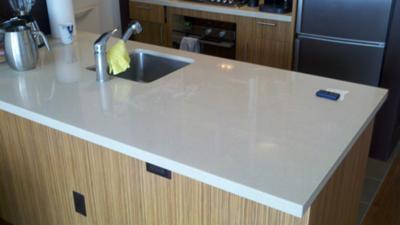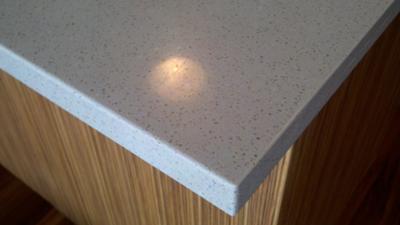Lime Etching on Quartz Countertops

quartz countertop etch damage
QUESTION:
First of all, thank you for a fantastic site.We have a large kitchen tabletop. All we know is that it is an Engineered Stone quartz countertop. It is light grey with darker colored dots. It has a shiny surface.
During social events, we have ended up with some rather serious etchings (we didn't conduct the lime test when we moved in).
The area covered by these etchings are approx. 10x10 inches and with your fingertips you can easily feel how the shiny layer is missing in that area, as well as being matte instead of shiny. Looks terrible.
The etching came after lime and soda stains were left for hours. Water doesn't stain at all.
We are wondering how we should proceed with repairing this etched area? Any tips or links much appreciated.
ANSWER:
Thanks for the compliment about our site. We certainly work hard to educate our viewers and provide the most comprehensive and unbiased information available about natural stone and engineered stone.Etching and any damage to engineered stone / quartz countertops is troublesome.
The marketing for quartz countertops would suggest that engineered stone is essentially stain and damage-proof.
Unfortunately, that is not the case. It can be stained and damaged by many things. And lighter colors tend to be more susceptible to damage than darker quartz countertop colors.
Also, damage to quartz is often permanent since what gets damaged is the colored resin, which cannot be repaired or restored.
This is where stone has a big advantage over quartz countertops. Stone can almost always be repair and restored to like new. Quartz typically cannot be repaired.
The good news is that significant damage to quartz or granite is not common.
But what to do in your case?
Well, quartz is very hard like granite, so there aren't any DIY products that can be used to repair etching.
Most likely re-polishing the quartz countertop is your only possibility.
I'd suggest contacting the manufacturer (if you can determine which company made your tops) and inquire about repair options and referral to a certified tech/fabricator in your area that can work on it.
Wish I could offer more concrete and actionable suggestions, but quartz countertops can be tricky when damaged and you have to go case by case on most.
Comments for Lime Etching on Quartz Countertops
|
||
|
||
|
||
|
||
|
||
|
||
|
||
|
||






